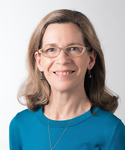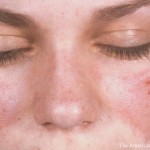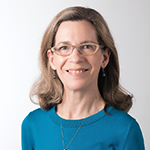
Lindsey A. Criswell, MD, MPH, DSc
In early 2021, Lindsey A. Criswell, MD, MPH, DSc, one of rheumatology’s preeminent autoimmune genetics researchers, will become the new director of the National Institute of Arthritis and Musculoskeletal and Skin Diseases. She will be the first woman to hold that post. Dr. Criswell will be leaving her current position as vice chancellor of research at the University of California, San Francisco (UCSF), where she is also a professor of medicine in the Department of Medicine, professor of orofacial sciences in the School of Dentistry, and the former director of the Division of Rheumatology.
Dr. Criswell has led multiple NIH grants as principal investigator and has published more than 250 peer-reviewed journal papers. Her work has contributed to the understanding of the genetics and epidemiology of autoimmune disease, especially rheumatoid arthritis and systemic lupus erythematosus.
‘Nature vs. Nurture’
Throughout her career, Dr. Criswell has been indefatigable in forging a unique research path. Although she trained with, and was exposed to, many influential physicians and researchers, “I never had a mentor who was doing exactly what I wanted to do,” she says. Her career path reflects her inquisitiveness about the epidemiology of disease processes and a willingness to explore intersectional possibilities with different disciplines and create productive collaborations.
Dr. Criswell recalls that her interest in science began early, with a fascination with the natural world. As she moved into high school, the pull toward math and the sciences remained strong. By the time she entered college at the University of California, Berkeley, “I knew I was going to major in something related to science,” she says. She gravitated to research, bolstered by undergraduate research opportunities at the Cold Spring Harbor Laboratory on Long Island, and study in biophysics in the Cyclotron Building at UC Berkeley’s Lawrence Berkeley Laboratory.
She discovered, in her initial science courses at Berkeley, that genetics offered the best example of a scientific field that incorporated mathematics, and specifically statistics. And, she adds, “What really sealed the deal for me was another long-standing fascination I had with the concept of nature versus nurture.” She earned her BS in genetics—“that was my scientific home.”
Keeping Options Open
As Dr. Criswell began to consider her ultimate career direction, she realized that a purely research track might not offer all the possibilities she was seeking. “I decided to apply to medical school largely to keep my options open,” she explained. She acquired her MD at UCSF in 1986, again opting for the broad scope—internal medicine—to keep her options open. During training, she says, she fell in love with the rheumatic diseases, especially scleroderma and dermatomyositis. Clearly, she recalls, “there was such a great need to understand these diseases better.” Rheumatology, then, became her medical home.
Reintroduction to Genetics
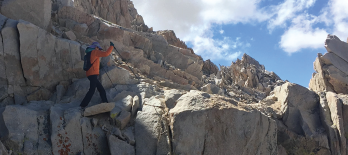
Dr. Criswell hikes a narrow rocky ledge close to the top of Mt. Whitney.
Next was a rheumatology fellowship at UCSF, combined with pursuing a master’s degree in public health at the UC Berkeley School of Public Health. There she encountered Mary-Claire King, PhD, renowned for her research in breast cancer genetics, and who was then involved in a lupus project.
Dr. King, currently professor of genomic sciences and of medicine at the University of Washington, Seattle, introduced Dr. Criswell to the new field of genetic epidemiology. By the time she finished her fellowship training in 1992, Dr. Criswell had determined that she would be a rheumatologist pursuing genetic epidemiology research.
Her fellowship mentor, the late Wallace V. Epstein, MD, a forward-thinking advocate for women and students of color, provided a “great training environment” and was supportive of her desire to pursue genetic epidemiology. UCSF, as an institution, had become keenly interested in human genetics, so Dr. Criswell took a faculty appointment there, and began to seek research funding for her work.
Opportunities Abroad
On two different occasions, Dr. Criswell took her family to Europe while she pursued additional training. At the Netherlands Institute for Health Sciences in Rotterdam, she obtained a DSc. Her twin daughters, age three, took to the language, which sparked Dr. Criswell’s plan to enroll them in a French immersion school once back in the States.
Her second international experience was with Prof. Xavier Mariette, MD, PhD, a world-renowned expert in Sjögren’s syndrome and head of rheumatology at Bicêtre Hospital, Paris-Sud University. That partnership was timely; Dr. Criswell was co-leading the Sjögren’s International Collaborative Clinical Alliance (SICCA) registry project, which had started in 2003, and Dr. Mariette’s group was interested in more involvement with genetics. While Dr. Criswell was in France, recruitment had begun for chief of the Division of Rheumatology at UCSF. She was selected for the position while abroad and started in the role upon her return, and served in that role until March 2020. Dr. Criswell became vice chancellor of research at UCSF in November 2017.
Teamwork Prominent
Throughout her years at UCSF, Dr. Criswell has built a research program focusing on the genetics and epidemiology of autoimmune disease, particularly RA and SLE. Collectively, these efforts, including performance of genome-wide association studies, have contributed to the identification of ~100 genes that influence risk and outcomes in RA and SLE. Several recent studies have investigated ethnic differences as they relate to autoimmune disease risk and outcomes. Other recent studies seek to define the contribution of epigenetic factors, such as DNA methylation patterns to disease risk and outcome.
“These investigations are by nature very collaborative,” Dr. Criswell points out, and require many researchers, as well as coordinated funding efforts. For example, developing research proposals and conducting research requires identifying leads for teams—one for the laboratory work and someone else to take the lead on recruiting the patients. Still another team must take the lead on analyzing the data.
“These groups have to work very closely together to coordinate the work. And so a prominent theme throughout my career in medicine and as a researcher has been teamwork,” she says. “I’ve never felt like I had to do this all on my own, or that I was competing directly against someone else. I’ve always been interested in exploring the challenging problems in our field that we should tackle and finding the people that we need to collaborate with to get this done.”
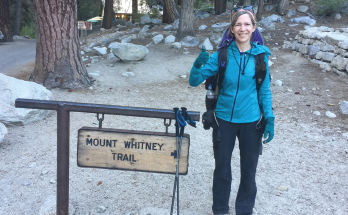
Dr. Criswell at the completion of the 72.2 High Sierra Trail, which includes Mt. Whitney.
“One of the many things I admire about Lindsey,” says Sharon Chung, MD, an associate professor at UCSF, “is her amazing ability to work with people and to be very generous with credit and opportunity. Everyone’s ideas are equally valued, and there is a very easy exchange of thought and possibilities.”
Dr. Chung came to UCSF with two very specific interests—vasculitis and genetics—and the goal of bringing the two together. Dr. Criswell, then, because of her reputation in autoimmune disease genetics, was one of the reasons Dr. Chung applied to UCSF for her fellowship training. She joined the UCSF faculty in 2007 after completing her fellowship training with Dr. Criswell.
“When I discuss my mentor/mentee relationship with others across the country, it becomes clear that I had a very unique relationship. Lindsey was always very selfless and would do whatever she could to advance me moving forward. I hope I’m able to provide that for the people I work with as well.”
Dr. Criswell’s egalitarian leadership style also stands out for Cristina Lanata, MD, an assistant professor of medicine at UCSF, who notes that Dr. Criswell was one of the main reasons she chose UCSF for her fellowship training. “She was one of the few scientists doing population-based studies of epigenetics,” says Dr. Lanata, who was born in Peru and early on in medical school had identified lupus as her area of interest.
Dr. Lanata began working with Dr. Criswell during the second year of her fellowship and has been impressed with Dr. Criswell’s efficiency, positive work ethic and humanity. “She always wants to be a team player and help the science go forward. She’s passionate about our work and tries to support it as much as she can.” Dr. Lanata says her own research ideas have been unconventional and that she has always had full support from Dr. Criswell for pushing them forward.
Work-Life Balance
Dr. Criswell says she had never felt disadvantaged by being female. Planning for a family brought some struggle over choices, she admits. Becoming a parent made her realize that one needs to pick a pursuit that is most compelling, and work to craft a balance between work and home life, by prioritizing and simplifying.
“I realized early on that becoming the traditional ‘triple threat’ academic—a fantastic clinician, teacher and researcher—wasn’t feasible, at least not for me,” she says. Referring to the aphorism, “it takes a village to raise a child,” she notes that, with twins “this is twice as true!” Knowing that she already gravitated toward teamwork, it made sense to her to “focus on the things I like to do most, and look to other people to fill in the gaps.”
Dr. Criswell is also an avid hiker and backpacker, and at one point obtained her certification as a first responder in wilderness medicine. She’s completed several fundraising hikes for the UCSF Rheumatology Fellowship Program, including the 72.2 mile High Sierra Trail, which includes Mount Whitney.
Dr. Criswell looks forward to the new challenges awaiting her as director of NIAMS. “I never imagined I’d be in this situation, but I’m thrilled and honored to have the opportunity,” she says.
Gretchen Henkel is a health and medical journalist based in California.
References
- Taylor KE, Wong Q, Levine DM, et al. Genome-wide association analysis reveals genetic heterogeneity of Sjögren’s syndrome according to ancestry. Arthritis Rheumatol. 2017 Jun;69(6):1294–1305.
- Lanata CM, Paranjpe I, Nititham J, et al. A phenotypic and genomics approach in a multi-ethnic cohort to subtype systemic lupus erythematosus. Nat Commun. 2019 Aug 29;10(1):3902.
